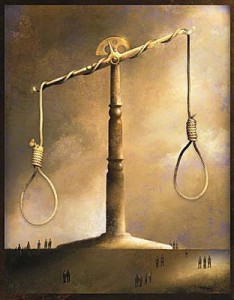Death Sentences Down, But Executions Up in 2009
For opponents of the death penalty, statistics from 2009 brought a mixed bag of news.
That same year, New Mexico became the 15th state in the U.S. to abolish capital punishment.
What caused these apparently conflicting trends? Well, it should first be noted that they aren’t as paradoxical as they may seem at first glance. It usually takes years before a death sentence in the United States is actually carried out, so a decline in sentences will not immediately lead to a decline in executions, since a person being executed in 2009 was likely convicted and sentenced years or decades ago.
 The slight increase in executions in 2009 over the 2008 numbers could be due to the fact that in 2007, and into part of 2008, the U.S. Supreme Court placed a de facto moratorium on capital punishment while it decided the case of Baze v. Rees, where the Court considered the constitutionality of the lethal injection method used by most states in the U.S., and by the federal government. The court eventually found the method to be constitutional, but for a few months in 2008, no executions were performed. This would easily explain the increase in 2009.
The slight increase in executions in 2009 over the 2008 numbers could be due to the fact that in 2007, and into part of 2008, the U.S. Supreme Court placed a de facto moratorium on capital punishment while it decided the case of Baze v. Rees, where the Court considered the constitutionality of the lethal injection method used by most states in the U.S., and by the federal government. The court eventually found the method to be constitutional, but for a few months in 2008, no executions were performed. This would easily explain the increase in 2009.
But what should we make of the decline in death sentences? Supporters of the death penalty claim that the decline is due to the declining murder rate (fewer capital crimes committed means fewer death sentences handed down). Opponents of the death penalty, on the other hand, argued that jurors are becoming far more cautions about handing down a death sentence.
While a majority of Americans continue to support capital punishment, answering a question in a poll is far different from actually sentencing a fellow human being to death. It has been suggested that jurors are aware of the high-profile exonerations of death row prisoners in recent years, and are far more wary of imposing a death sentence if there’s even a slight chance that the defendant is innocent.
Furthermore, some observers believe that it is only a matter of time before someone is definitively proven to be innocent after they’ve been executed. Thankfully, this has not happened yet. Of course, this does not discount the possibility that innocent people have been sentenced to death and executed in modern American history, but there have been no cases where this has been definitively proven.
For many years, the trend in the U.S. has been towards abolishing the death penalty (as mentioned earlier, 15 states have done away with the death penalty) or severely limiting its application. A little over a year ago, the Supreme Court ruled that the death penalty cannot be imposed for the crime of raping a child, essentially limiting the death penalty to crimes in which the victim is actually killed (with the possible exception of treason). This follows on the heels of the Supreme Court barring executions of the mentally disabled, and individuals who were under 18 years old at the time they committed the capital crime.
What the future holds for the Death Penalty in the United States is uncertain. President Barack Obama, who is considered by some to be the most liberal president in a generation (of course, opinions will vary on this fact, and whether it’s a good or bad thing) has repeatedly voiced his support for the death penalty. It should be clear that those who advocate full abolition of the death penalty in the U.S. face an uphill battle, at least in the foreseeable future.
For good or ill, the United States is nearly unique among fully developed nations in its continued use of capital punishment (Japan and Singapore being the only others), and is arguably the only liberal democracy that still uses it. Again, I’ll leave the decision as to whether that’s a good or bad thing up to you.
Whatever developments 2010 brings for sentencing policy in the United States, they’re sure to be interesting, and you can be sure that they’ll be discussed here.


Comments
Death sentences have been abolished in a lot of countries as it was not a good practice. Sometimes someone who was caught in a controversy was given a death sentence without true reasons.
For good or ill, the United States is nearly unique among fully developed nations in its continued use of capital punishment (Japan and Singapore being the only others), and is arguably the only liberal democracy that still uses it.